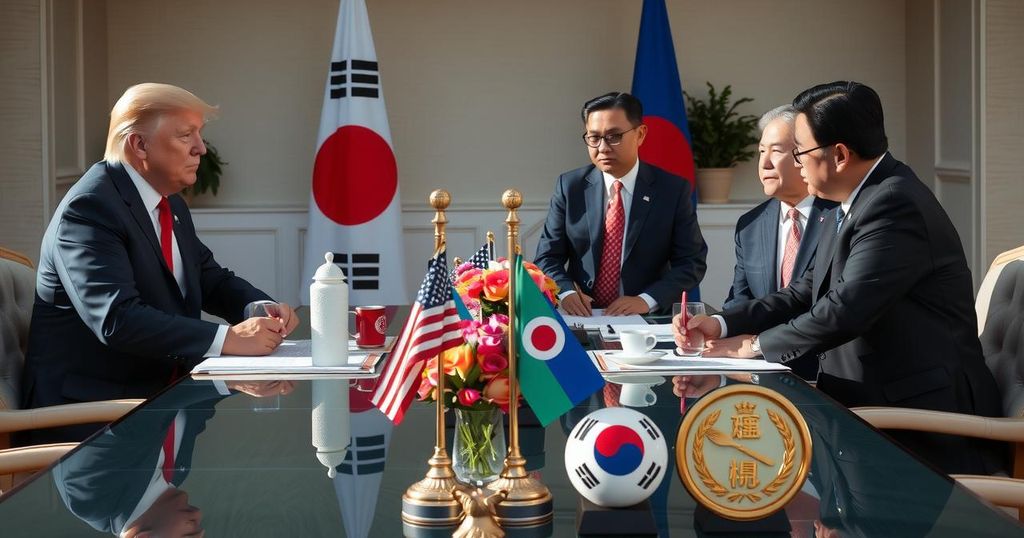President Trump’s second term raises uncertainty regarding U.S. policy on Korea, specifically troop presence and engagement with North Korea. His cabinet picks, such as Marco Rubio and Mike Waltz, suggest a strong defense approach, while nominees like Pete Hegseth and Tulsi Gabbard indicate potential for diplomatic engagement. The complex interplay of these perspectives shapes the future of U.S.-Korean relations.
Uncertainty persists regarding President Trump’s approach to Korea during his anticipated second term. Questions arise about whether he intends to withdraw U.S. troops unless South Korea significantly increases its financial contribution, if he would engage directly with North Korea while sidelining Seoul, or if he will emphasize strong security ties with Korea to counter China. Trump’s nominations for key roles suggest a complex blend of traditional and isolationist politics.
The appointment of Florida Senator Marco Rubio as Secretary of State and Rep. Mike Waltz as National Security Adviser signals an internationalist stance, with both individuals advocating for a robust defense strategy against China and a tough posture towards North Korea. Rubio’s historical engagement with Korean issues, including calls for heightened sanctions and a commitment to maintaining American defense alliances, underscores a continuation of vigilance towards Pyongyang. Meanwhile, Waltz’s military background positions him similarly; however, he may be more amenable to Trump’s evolving engagement strategy following his loyalty to the president-elect.
Further insights can be discerned from Alex Wong’s role as Deputy National Security Adviser, given his involvement in orchestrating Trump’s summit with Kim Jong-un previously. Wong’s perspective indicates a potential for renewed talks, alongside CIA nominee John Ratcliffe, whom analysts perceive as supportive of dialogue based on previous statements regarding North Korea’s motivations. Ratcliffe has indicated that North Korea views its nuclear arsenal as an essential deterrence.
Conversely, candidates espousing a less confrontational approach include Pete Hegseth for Secretary of Defense and Tulsi Gabbard for Director of National Intelligence. Both individuals belong to a faction that critiques interventionist policies attributed to previous administrations, advocating instead for a diplomatic resolution to the Korean issue. However, their potential approval in the Senate may face hurdles.
President Trump’s favorable remarks towards Kim Jong-un, coupled with South Korean President Yoon Suk Yeol’s internal struggles, may work in favor of a re-engagement approach with North Korea. Despite Kim’s apparent hardline rhetoric, analysts speculate it could serve as a precursor to encourage further negotiations. The evolving geopolitical landscape, combined with Trump’s cabinet choices, indicates that North Korea will remain a pivotal issue in U.S. foreign policy.
The future of U.S. policy towards Korea remains uncertain as President Trump prepares for a potential second term. Key questions revolve around military presence, fiscal commitments from Seoul, and overall engagement strategies with North Korea. Trump’s cabinet selections provide insights into his administration’s direction, highlighting the ideological divides between internationalists who advocate for strong defense commitments versus isolationists who prefer negotiation and disengagement. Understanding these dynamics is crucial for predicting the trajectory of U.S.-Korean relations moving forward.
In summary, the upcoming term for President Trump will navigate significant uncertainties regarding U.S. policy in Korea. His cabinet selections reflect a blend of strong defense and potential openness to negotiation with North Korea. With varied visions represented in Trump’s approach, including hardline stances against China and calls for direct engagement with Pyongyang, the future of U.S.-Korean relations remains closely tied to these evolving dynamics within the administration.
Original Source: www.koreatimes.co.kr






